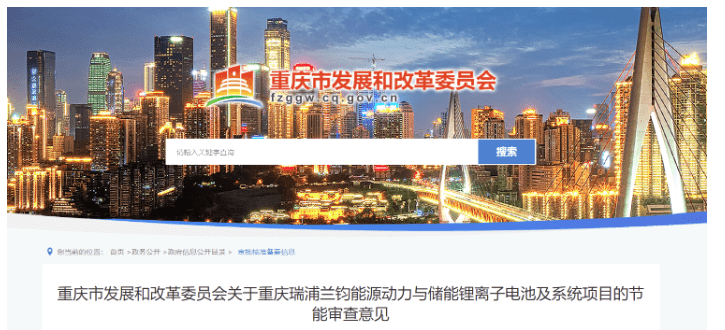Chongqing Ruipu Lanjun Energy Power and Energy Storage Li-ion Battery and System Project Approved
Recently, Chongqing Municipal Development and Reform Commission issued the "Review Opinions on Energy Conservation of Chongqing Ruipu Lanjun Energy Power and Energy Storage Lithium-ion Battery and System Project".

Energy-saving Review Opinions on Chongqing Ruipu Lanjun Energy Power and Energy Storage Lithium-ion Battery and System Project
Chongqing Ruipu Lanjun Energy Co:
Your unit's "Letter on Reporting for Review of Chongqing Ruipu Lanjun Energy Power and Energy Storage Lithium-ion Battery and System Project Energy Conservation Report" and related materials have been received. In accordance with the "Measures for Energy Conservation Review of Fixed Asset Investment Projects" (National Development and Reform Commission Decree No. 2 of 2023) "Chongqing Municipal Implementing Measures for Energy Conservation Review of Fixed Asset Investment Projects" (Chongqing Development and Reform Norms 〔2023〕 No. 4), combined with the review comments of Chongqing Tongfeng Engineering Management Consulting Co. on Chongqing Ruipu Lanjun Energy Power and Energy Storage Lithium-ion Battery and System Project (hereinafter referred to as the "Project") energy conservation report, the review comments are as follows:
1. Agree in principle to the energy conservation report of the project (Project Code: 2303-500102-04-01-815304).
2. The products of the project are power and energy storage lithium-ion batteries, and the comprehensive energy consumption per unit of product is 138.40 kg of standard coal per 10,000 ampere-hours, which reaches the advanced level of the Evaluation Indicator System for Cleaner Production of the Battery Industry (Bulletin of the National Development and Reform Commission No. 36 of 2015). The energy consumption per unit of industrial added value of the project is 0.428 tons of standard coal per ten thousand yuan.
3. After the project reaches production, the annual comprehensive energy consumption of the project will be 128,600.57 tons of standard coal (equivalent value) and 214,086.69 tons of standard coal (equivalent value), of which: the annual consumption of electricity will be 478,645,700 kilowatt-hours, which is equivalent to 58,825.56 tons of standard coal (equivalent value) and 144,311.68 tons of standard coal (equivalent value); and the annual consumption of natural gas will be 61,481,200 cubic meters, which is equivalent to 697,575.01 tons of standard coal. equivalent to 69,775.01 tons of standard coal.
4. Please ask the project legal person to further do the following energy-saving work on the basis of the strict implementation of the energy-saving measures in the energy-saving report:
(a) Optimizing the structure of energy use. In the case of meeting the technical requirements of the process, rationally arrange the production workshop equipment, process flow, division of production areas, reduce the process consumption of materials, energy in the transmission, distribution and main production processes, and improve the efficiency of energy utilization.
(b) Selection of energy-efficient equipment. Boilers, transformers, water pumps, fans, air conditioners, air compressors and other production equipment selection focuses on safety, high efficiency, and give priority to the selection of products and equipment to achieve the national level of energy-efficiency standards or a comparable level of products and equipment, and shall not be banned and eliminated by the state of the energy-using products and equipment.
(C) effectively strengthen energy conservation management. According to "Energy Management System Requirements and Guidelines for Use" (GB/T23331-2020), "Guidelines for Energy Management in Industrial Enterprises" (GB/T15587-2008), etc., establish a sound energy management system; according to "General Rules for the Equipping and Management of Energy Measuring Instruments for Energy-Using Units" (GB17167-2006) and other standards and norms, improve the project's main energy-consuming equipment measuring instruments, configure and improve the level of energy measurement and monitoring. Configuration, enhance the level of energy measurement and monitoring, while combining the project energy monitoring needs, to further refine the project energy measuring instruments equipped with programs to do a good job of energy statistics and analysis.
(D) carry out energy-saving acceptance as required. Before the project is put into production or use, energy-saving experts should be organized or entrusted to the relevant institutions to carry out acceptance, and timely through the "investment project online service supervision platform" to the energy-saving review authority to submit energy-saving acceptance report, as an important basis for supervision and inspection.
(e) Implementing the management requirements for key energy-using units. In accordance with the "Measures for Energy Conservation Management of Key Energy Consuming Units" (National Development and Reform Commission Decree No. 15 of 2018), it shall establish and improve the energy management system, conscientiously implement the energy conservation target responsibility system and energy conservation assessment and evaluation system, and accept the supervision of the competent authorities in charge of energy conservation in accordance with the regulations.
5. Municipal energy-saving authorities will be the implementation of the project energy-saving review of the views of the timely organization of supervision and inspection, the implementation of the implementation of the lack of will be dealt with seriously in accordance with the relevant provisions.
6. If there are significant changes in the construction location, construction content, construction scale, energy efficiency level, etc., or if the actual annual comprehensive energy consumption exceeds the level approved by the energy conservation review by 10% or more, the construction unit shall submit an application for change to the original energy conservation review authority.
7. This review does not review matters other than energy conservation for project energy use, and does not serve as the basis or precondition for the fulfillment of other review procedures, except as otherwise provided by laws and regulations.
8. This review is valid for 2 years from the date of issuance, and the project shall be re-examined for energy conservation if it is overdue to start construction or if the completion time exceeds the expected completion time in the energy conservation report by more than 2 years.
Chongqing Development and Reform Commission
February 18, 2024